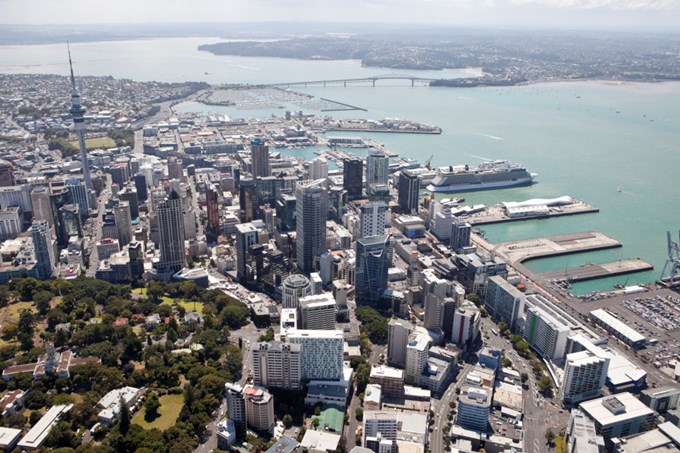Auckland Mayor Phil Goff today released his final proposal for Auckland Council’s 10-year Budget setting out $26.2 billion of investment over the next decade to address critical issues of traffic congestion, housing affordability and protecting the environment.
The mayor’s final 10-year Budget proposal contains:
- Largest-ever council transport investment of $12 billion over the next 10 years (including $4.3 billion from leveraging the Regional Fuel Tax).
- Cleaning up Auckland’s waterways and beaches with new investment of $452 million in stormwater infrastructure through a water quality targeted rate.
- Protecting kauri and our native flora and fauna with an additional $311 million from a natural environment targeted rate to fund pest and disease control.
- Adapting to climate change and protecting communities with the establishment of a $40 million Climate Change Response Fund and an additional $90 million for coastal asset management.
- Investing in sports and culture by establishing a contestable fund of $120 million for sports and recreation facilities and an additional $20 million funding for the Auckland Art Gallery.
- Delivering improved social outcomes with the expansion of The Southern Initiative into west Auckland to increase employment and life skills for young Aucklanders and $475,000 to help Auckland City Mission redevelop its Hobson Street site.
- Restricting the average general rate rise to 2.5 per cent for this term of council and continuing Value for Money programme and a new corporate property strategy saving $117 million to deliver efficiency and effectiveness at council.
Mayor Phil Goff said, “This build-it budget is going to get Auckland moving with investment of more than $26 billion over 10 years to reduce transport congestion, unlock greenfield housing development, clean up our beaches and protect our environment.
“For too long, Auckland has suffered from under-investment with the critical issues of transport, housing and our environment being left in the too-hard basket. This council is tackling these long-standing issues with the largest-ever investment in Auckland infrastructure.
“The government and Auckland Council are addressing congestion with $28 billion of transformative investment in our transport network and Aucklanders will contribute their fair share through a regional fuel tax (RFT) at 10 cents per litre plus GST.
“When combined funding from government subsidies, the RFT will unlock $4.3 billion additional investment across our region, increasing the provision of public transport, improving our roads, cycleways and walkways and making Auckland less congested and safer.
“The consultation showed that Aucklanders care about the environment with strong support for both proposed targeted rates to address serious environmental issues in our region.
“Additionally, $452 million from a new water quality targeted rate will clean up our beaches and harbours by funding the construction of much-needed stormwater infrastructure. This will reduce wastewater overflows into our harbours by up to 90 per cent and allow us to do in 10 years what would normally have taken 30 years.
“A new natural environment targeted rate will allow the investment of $311 million to address the spread of kauri dieback disease and tackle the pests that are killing our native birds and trees.
“Climate change is a reality we have to address and, as a coastal city, Auckland must adapt. I am proposing an additional $90 million to invest in our coastal assets to protect our communities, and want to see an increase in operating expenditure to develop coastal management plans."
“Earlier this year we saw the damage that increasing cyclones can do to our city. Severe weather events will become more common as our climate changes and the establishment of a Climate Change Response Fund of $40 million will ensure we can better address emergency infrastructure repair work as a result of climate-related events.
“Unprecedented population growth has placed significant pressure on our city. Our priorities, therefore, must be to provide infrastructure needed for transport, housing and a clean environment. However, within the constraints of our resources, we also need to promote the innovation, diversity, inclusiveness, and cultural and recreational facilities that make Auckland a great city.
“The council is working with our local boards and the Independent Maori Statutory Board to deliver positive outcomes across all of Auckland for our local communities and for Māori.
“We are also establishing a contestable Sports and Recreation Facilities Investment Fund of $120 million that will enable the council to work with community groups to increase the provision of indoor and outdoor facilities needed to cater to a growing population.
“The Auckland Art Gallery is a centre of cultural life and a major visitor attraction and will receive an additional boost of $2 million of funding per year.
“As well as building infrastructure I want to help build careers for our young people. Expanding The Southern Initiative into west Auckland with an additional $5 million operational funding will provide life skills and jobs in poorer communities through social procurement and trades training.
“We will continue to look after those Aucklanders most in need, contributing $475,000 to the Auckland City Mission to improve their Hobson Street property. We are proposing $3.7 million to Surf Lifesaving Northern Region to invest in the development of their facilities, and $2 million to the Auckland Rescue Centre.
“This budget increases investment in critical infrastructure while keeping rate rises low and reasonable. Auckland is experiencing unprecedented population growth and we still need to do more. I will continue to work with government and council to develop innovative ways to fund further investment in our city,” said Phil Goff.
Auckland Council’s Governing Body will decide on the Mayor’s final 10-year Budget proposal on Thursday before a final decision is taken at the end of June to strike the new budget for 2018 – 2028.


